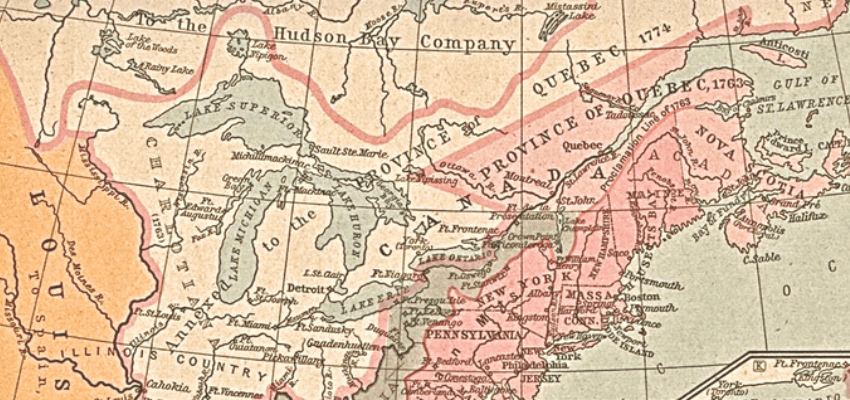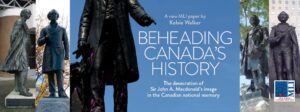By Alexander Herman, June 5, 2024
It is partly a myth that Canada is a “new country.” Not only did the First Nations inhabit this land for millennia, but even the institutions and legal structures that made Canada what it is trace their origins back to the 18th century.
This year marks the 250th anniversary of Canada’s proto-constitutional bedrock, the Quebec Act of 1774. Despite being mostly forgotten today, this remarkable statute set out the principles that went on to create the framework for modern Canada – principles that would find their full expression at Confederation in 1867 and, later, with the Charter of Rights and Freedoms in 1982. Without the Quebec Act, Canada wouldn’t be the country we know today.
After the defeat of the French on the Plains of Abraham in 1759, the British issued a Royal Proclamation in 1763 that set the parameters of English rule in North America. The intention was for French-speaking and Catholic canadiens to be assimilated into the British Empire, economically, politically, and religiously. In fact, one of my distant Swiss relatives, a clergyman by the name of David-François de Montmollin, was conscripted to come to Quebec and offer the inhabitants ministry in the Protestant faith – in French, of course. But it was not to be.
After eleven years of an experiment in governance, the British Parliament passed the Quebec Act on June 22, 1774, almost exactly 250 years ago. Published in both English and French, the Act guaranteed liberties for the French Canadians: it protected their Catholic faith and their clergy (making my poor relative’s purpose entirely obsolete), restored much of the French legal system and the seigneuries, and allowed Catholics to hold public office within the colonial system. This was the first example of the British Empire guaranteeing extensive protections to a recently conquered people. In fact, the obligation for public officeholders to renounce the Catholic faith was removed in Quebec more than 50 years before it was removed in Ireland.
It was a bold move by an administration that was not universally admired. On the contrary, the restive inhabitants of the Thirteen Colonies found it nothing short of abusive. In the aftermath of the Boston Tea Party the previous year, it was seen from the south as a provocation by a hostile Parliament. It would soon be numbered among the “intolerable Acts” that helped spark the American Revolution. Alexander Hamilton (a figure whose fame has now been rekindled thanks to Broadway) wrote furiously that it would lead to “arbitrary power” and a “priestly tyranny,” threatening to ruin American posterity.
The Act also made the new Province of Quebec enormous, extending its borders to the confluence of the Mississippi and Ohio Rivers, far beyond what American Patriots like Hamilton would countenance. It boggles the mind that much of the United States Midwest was once part of the “Province of Quebec” (territory that today includes cities like Detroit, Cleveland, Chicago, and Indianapolis).
In the immediate aftermath, the rights afforded to French Canadians under the Act seemed to turn them away, haltingly, from rebellion. In the early days of the Revolution, entreaties were made by the Continental Congress for the canadiens to join the revolt against the English. No less a figure than Thomas Jefferson wrote in a letter of November 1775 that, “we have reason to hope the delegates of Canada will join us in Congress and complete the American union, as far as we wish to have it completed.” Massachusetts and Connecticut sent troops to march on Montreal and Quebec City with the intent of bringing about just such a union.
In the end, the French Canadians stayed surprisingly loyal to the Crown. Monseigneur Jean-Olivier Briand, Bishop of Quebec, called on his countrymen to do their utmost to repel the invasion: “Your oaths, your religion, impose on you an unmistakable obligation to defend with all your power your land and your King.” The Americans were defeated in December 1775 and the siege of Quebec was lifted the following spring when British support arrived. The idea of a republic along the St Lawrence was cast out – and the Quebec Act was a major reason for that.
Beyond the geopolitical impact, the Act also set the scene for how British North America would develop over the following two centuries. The support of Catholicism and its clergy (dreaded “Popery,” according to Hamilton) showed an ability to tolerate differences of religion within the same polity, while refraining from denominational preference or cultural assimilation (despite my relative’s futile attempts). It underpinned not just the ethic of religious and ethnic tolerance that prevails in Canada today, but also helped to explain the more formal role played by the Catholic Church in the constitutional structure of Canada: unlike in the United States where organized religion and government are kept entirely separate, the law in Canada maintains a particular role for religious organizations in the public space (like Catholic school boards of Ontario).
In restoring the old French legal system for property and civil rights, the Act also laid the groundwork for Quebec’s unique legal system today, which still follows a French model built around a Civil Code, juridically distinct from the English common law that operates across the rest of Canada. And yet the maintenance of the “Criminal Law of England” introduced a distinction between the categories of private and public law, later echoed in the Federal-Provincial division of powers central to the British North America Act at the time of Confederation in 1867.
Looking back at the Quebec Act, how should we judge it? Was it a commendable law securing important civil and religious rights – or was it an affront to the freedom of markets and of true democracy, as the Americans saw it?
It was, in fact, both. In many ways, it would help to cleave the continent in two, with an experiment in Yankee Republicanism to the south and loyalty to the Crown in the north; with individualism on one side and a more cautious communalism on the other. In some ways, it would create a social, political, and psychological division that would persist for a very long time indeed.
Alexander Herman is a member of the Quebec Bar and Director of the Institute of Art and Law.







